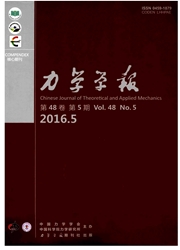

 中文摘要:
中文摘要:
非线性切换系统具有广泛的工程背景,而传统的非线性理论不能直接用来解决其中的问题,因而成为当前国内外热点和前沿课题之一。目前相关工作大都是围绕固定时间或单状态切换开展的,而实际工程系统大都属于多状态切换问题,同时多状态切换涉及到更为丰富的动力学行为。本文基于两广义BVP振子,通过引入双向切换开关,构建了双状态切换下的非线性动力学模型,进而研究状态切换导致的各种运动模式及其相应的产生机制。应用非光滑系统的Poincar′e映射理论,推导了双状态切换下的Lyapunov指数的计算公式,结合子系统的分岔分析,得到了切换系统随分岔参数变化的动力学演化过程及其相应的最大Lyapunov指数的变化情况。得到了双状态切换条件下系统存在着各种形式的振荡行为,分析了诸如周期突变等现象及通往混沌的倍周期分岔道路,揭示了不同运动模式的产生机制及倍周期序列的本质。与固定时间切换和单状态切换系统不同,双临界状态切换系统存在着更为丰富的非线性现象,其主要原因在于双状态切换会产生更多的切换点,且切换点的位置更加多变。同时切换系统的倍周期分岔序列与光滑系统中的倍周期分岔序列不同,切换系统的倍周期分岔序列只对应于切换点数目的成倍增加,而其相应的周期一般不对应于严格的周期倍化过程。
 英文摘要:
英文摘要:
The dynamics of nonlinear switched systems which possess wide engineering background and cannot be explored directly by traditional nonlinear theory, become one of hot and frontier tasks at home and abroad for the time being. The complicated behaviors as well as the mechanism of the vector field alternated between two subsystems by two different critical states are investigated in this paper. Upon employing the typical generalized BVP oscillator as an example, by introducing bilateral switch, the nonlinear dynamical model alternated between two subsystems related two states is established, the different movement forms as well as the dynamical evolution of which caused by switches are explored in details. Based on the Poincar ′e theory of nonlinear system, the computational equation of Lyapunov exponents of switched system is derived. Combined with the bifurcation analysis of subsystems, different oscillations of the system are discussed, upon which the nonlinear behaviors such as sudden changes of period in periodic oscillations and the route to chaos with period-doubling bifurcations as well as the related essence are presented. Different from the systems with fixed time or single state switch, much more nonlinear phenomena may be observed in the dynamic systems with two state switches in which there may exist more switch points with changeable positions. Furthermore, different from the cascading of period-doubling bifurcations in smooth systems, the period-doubling bifurcations in switched systems correspond to the doubling of the number of switch points, which usually does not correspond to the doubling of the real periodic length of the movements.
 同期刊论文项目
同期刊论文项目
 同项目期刊论文
同项目期刊论文
 期刊信息
期刊信息
